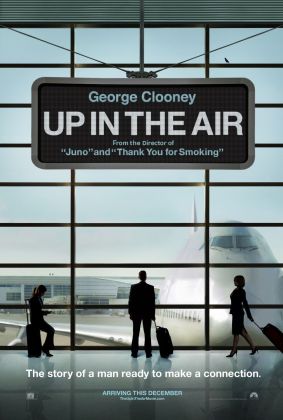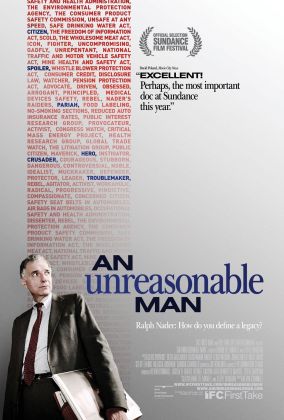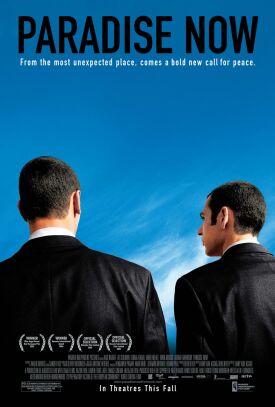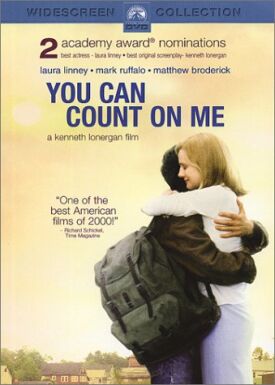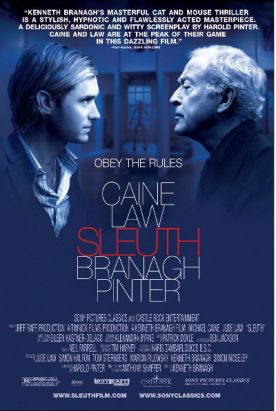Up in the Air
Film critics are so easy to please. You just have to give them a high concept, a bit of politically correct cynicism about the evils of “capitalism” or the “system” or the armed forces or the government security apparatus, add a couple of hip, attractive and sexually adventurous people with a vulnerability or two between them, some nostalgia about families or small-town America, finish it all with an unhappy but ambiguous ending and, voilà, the next thing you know you find your movie on their list of the year’s ten best. You may even find that the hype generated by the critical golden opinions garnered in this way will result in your movie’s pulling down as much as a tenth or so of the revenue of some vacuous, high-tech, kid-pleasing extravaganza like Avatar. At any rate, this is the only explanation I can find for the enthusiasm which so many of my critical brethren have lavished on Jason Reitman’s Up in the Air.
The high concept in this movie, adapted by Mr Reitman and Sheldon Turner from a novel by Walter Kirn, is that of a man who claims to like being homeless — or virtually homeless — because his constant traveling is bringing him ever closer to the object of his adoration, which is the élite status that comes with 10 million frequent flyer miles on American Airlines. Ryan Bingham (George Clooney) proudly tells us in voiceover — always an indicator of a film-maker’s going for the gold of self-conscious profundity — that in the last year he has spent 322 days on the road and a mere “43 miserable days at home.” Every so often his peripatetic path crosses with that of Alex Goran (Vera Farmiga), a woman who travels almost as much as he does, and they have a fantastically satisfying coital encounter in some hotel room. “Just think of me as yourself, only with a vagina.” she says to him, wittily.
Ryan is Up in the Air so much because his job calls for him to fly around the country for a company to which other companies have outsourced the distasteful task of laying off their employees, and the late recession (you may have heard about it) fills the role of the peg on which that booming business is suspended. So there’s capitalism getting it in the neck as usual: the promise of Woody Guthrie’s “This Land is Your Land” as sung by Sharon Jones and the Dap Kings over the opening credits is thus fulfilled. So far so good. But the plot is of as little interest to the film-makers as it generally is these days. We, along with Ryan’s company, are introduced to whiz-kid Natalie Keener (Anna Kendrick), just out of Cornell, who thinks she can do Ryan’s job and that of the other terminators remotely, by streaming video over the Internet. Ryan is supposed to be taking her on yet another road trip to show her how the job is being done at the moment and, presumably, to prepare the way for his own return to earth.
Now, the rationale of Ryan’s company is that there is a market for people who specialize in extremely difficult face-to-face encounters to subcontract their services out to those who are squeamish about such encounters. If the specialists then turn around and say, they’re switching over to firing people via the Internet, then they have undermined the whole foundation not just of the company but of the business. How many of those that, as yet another of Ryan’s voiceovers puts it, “don’t have the balls” for a personal interview of this sort, are going to pay conscience-money to someone as cowardly as they are? Yet the absurdity of Miss Keener’s business innovation never seems to occur to anyone, not even those who, like Ryan, are opposed to it.
The movie is too eager to put Ryan and Natalie together as a way of almost, but not quite, bringing about a crisis in Ryan’s personal life to reflect that the story of how this is supposed to come about is as fantastical as everything else about it.
And this major structural fault is just one of the things that is wrong with the movie. The idea of a man who has managed to pass his life avoiding all normal human ties feeling a sentimental sense of loyalty to a frequent-flyer program has strong comic potentialities of which little or nothing has been made. This and other comic, or tragi-comic slam-dunks are simply missed. “People do strange s*** when they get fired,” one of Ryan’s voiceovers tells us. Yet, oddly, hardly anyone does in this picture. There’s another opportunity lost. Why wouldn’t they do strange s***? Perhaps it is in order to make Mr Clooney’s character come off looking better than he would if they did do strange s***.
Similarly, when Ryan tells us confidently of one of his terminees, Steve (Zach Galifianakis), that “I will never see Steve again,” he doesn’t! What’s up with that? The inevitable comic encounter with someone our hero never expected to meet in a normal human situation proves evitable after all. Steve simply disappears from the film, along with all but one of the other human rejects he has had to fire with a little motivational speech along the way. Has Mr Reitman forgotten them? Are their stories just window dressing in Ryan Bingham’s life for him as well as for Ryan himself. About that, I have no ideas at all. And then there is the dialogue. Here is what I guess is meant to sound like some witty, Wildean banter between Ryan and his boss (Jason Bateman) on the phone together.
Boss: “I just had my first crap in two weeks.”
Ryan: “That’s the sound of me hanging up on you.”
Boss: “Great. I love that sound.”
Likewise, in the small-town nostalgia bit, when Ryan takes Alex to his home town in northern Wisconsin in the dead of winter for his sister’s wedding, he is suddenly called upon to attend to the bridegroom, Jim (Danny McBride), who has cold feet not due to the weather. “I tell people how to avoid commitment,” Ryan protests, but this seems to make no difference to anyone. His powers of persuasion are therefore presumably taxed to the uttermost with his advice to Jim that “life is better with company. Everybody needs a co-pilot.” This not only does the trick so far as re-routing Jim down the aisle is concerned, but it makes our hero begin to think that maybe, just maybe, he needs a co-pilot of his own. Bet you couldn’t see that one coming. But don’t worry. Not to engage in spoilers or anything, but in the end Ryan remains the cool, airborne Lothario he has always been. After all, that’s how the critics want him to be.
Discover more from James Bowman
Subscribe to get the latest posts to your email.

